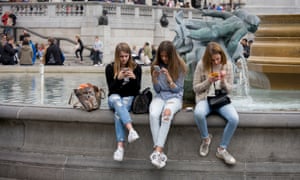
Is social media addictive? The issue is complex, and probably generational.
It’s obvious that what social media does to us, especially those of us who are heavy users, is not natural, or normal. It’s not normal to submit opinions for approval every day to an online crowd, nor is it normal to consume the opinions of strangers in bulk. It’s not normal to live under the surveillance of software companies, which tailor their advertising with such eerie precision that it seems impossible that they are not listening in on our conversations. It’s definitely not normal to wake in the night to use social media, or to spend roughly 24 hours a week on it, returning again and again even though it can make us feel depressed and alone. None of these behaviours were normal a few decades ago, nor are they especially useful to us today, but they’re practised by billions of people across the world.
On Monday a report was published by an all-party parliamentary group (APPG), proposing that internet addiction could be classified as a disease, and that research into its impact on mental health could be funded by a taxing social media companies. The paper includes surveys showing that 27% of children who spend three or more hours a day online show symptoms of mental ill health, and called for “robust, longitudinal research” into the possibility of social media addiction.
Addiction is characterised by abnormal behaviour, but what is “normal” any more? Could anyone stand to live without a smartphone, in 2019, and to go without social media? There will be readers who argue it’s easy, but for a vast number trying to stay afloat in a precarious, internet-ravaged job market, the answer is no.
The stereotype of the basement-dwelling internet addict is not new – it’s more than two decades since Japanese psychologist Tamaki Saitō coined the term hikikomori to describe a generation of recluses in Japan, who traded their social lives for internet, video-game and media consumption and a state of “adolescence without end”. In 1995, The Unabomber manifesto asked that we “never forget that a human being with technology is exactly like an alcoholic with a barrel of wine”. Its author, Ted Kaczynski, is, of course, a murderer and a terrorist, and steeped in his own rigidly biased view of civilisation, but the line is prescient: we are the alcoholics, and the barrel is a collection of scrolling feeds we gorge on, drowning before we’ve had our fill. Add social media, and the result is a toxic brew of solipsism and information overload, the kind that one is either overwhelmed by, or turns one into a monster in order to survive. The UX design employed by these platforms is a maze of dark patterns and cues borrowed from the world of gambling. To use these sites is to become “addicted” – it’s in their interest that you never sign out, and keep generating data indefinitely.

Three years ago I was advised by psychiatrists to avoid social media. 2016 was, by anyone’s standards, a fairly difficult year to be on the internet, but the experience had left me neurotic and self-loathing, experiencing multiple panic attacks every day. I spent more time online than with other people, and social media had narrowed my view of the world, encouraging me to think in binary terms of good and bad, like and dislike, the kind of black-and-white thinking common to personality disorders and depression.
The link between social media and this narrowing of perspective is well documented: back in 2011, the term “filter bubble” was popularised by Eli Pariser in his book of the same name. It describes the algorithmic hypnosis that companies like Google, Facebook and Twitter perform on their users, learning their habits and reinforcing them with tailored content. Social media, which once promised to act as a window to the world, has slowly but surely become an engine for a kind of global solipsism, a breeding ground for “fake news”, bias, compulsion and vanity – which profit the shareholders of these platforms.
One benefit of a disease classification would be that psychiatric professionals might take social media more seriously. On the other hand, it risks shifting focus away from governments, which have failed to regulate platforms, encouraging a culture where vulnerable individuals are at fault. While, in the US, the senator Elizabeth Warren recently proposed to break apart tech multinationals and rework antitrust laws, the MPs’ report feels unambitious, and more like a palliative measure.
Any resulting regulation must focus on living with social media, rather than abandoning, restricting or censoring it – even for children and young adults. We’re all cyborgs now: we outsource our emotions, our relationships and our working lives to the internet. Could this behaviour be a “disease”, when it threatens more than 3 billion users? For better or worse, might it not be an evolution?
When democracy and data privacy…
… come under threat, we must keep challenging those who undermine it. It’s been a year since The Observer and The Guardian broke the story that became the Cambridge Analytica scandal, exposing the truth and shedding light on the reality of foul play within the tech industry. We saw how personal data could be harvested on an unprecedented scale to fulfill the ambitions of the powerful. Through this courageous investigative reporting, we shamed Facebook, and prompted a global conversation about the importance of data privacy, holding tech companies to account and pressuring governments to enact regulation.
The Guardian is committed to continuing this vital work; we will keep persevering, uncovering and challenging those with so much power in the tech industry. This has never been so pressing: we’re living in a time when the integrity of our democracy and the legitimacy of our votes are in question. Political campaigns reside in our many digital feeds and, with each year, this will become ever more prominent. The world needs journalism that promotes transparency and investigates where others won’t go. Reader support means The Guardian can keep investigating the critical issues of our time.
The Guardian is editorially independent, meaning we set our own agenda. Our journalism is free from commercial bias and not influenced by billionaire owners, politicians or shareholders. No one edits our editor. No one steers our opinion. This is important as it enables us to give a voice to those less heard, challenge the powerful and hold them to account. It’s what makes us different to so many others in the media, at a time when factual, honest reporting is critical.
Every contribution we receive from readers like you, big or small, goes directly into funding our journalism. This support enables us to keep working as we do – but we must maintain and build on it for every year to come.
[“source=theguardian”]
 Techosta Where Tech Starts From
Techosta Where Tech Starts From